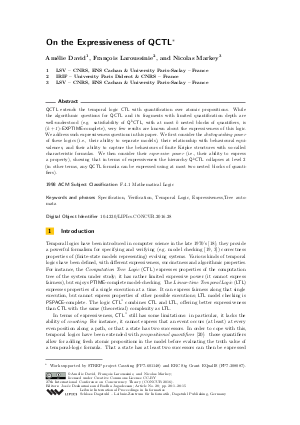On the Expressiveness of QCTL
Authors Amélie David, Francois Laroussinie, Nicolas Markey
-
Part of:
Volume:
27th International Conference on Concurrency Theory (CONCUR 2016)
Part of: Series: Leibniz International Proceedings in Informatics (LIPIcs)
Part of: Conference: International Conference on Concurrency Theory (CONCUR) - License:
 Creative Commons Attribution 3.0 Unported license
Creative Commons Attribution 3.0 Unported license
- Publication Date: 2016-08-24
File

PDF
LIPIcs.CONCUR.2016.28.pdf
- Filesize: 0.6 MB
- 15 pages
Document Identifiers
Subject Classification
Keywords
- Specification
- Verification
- Temporal Logic
- Expressiveness
- Tree automata
Metrics
- Access Statistics
-
Total Accesses (updated on a weekly basis)
0Document
0Metadata
Abstract
QCTL extends the temporal logic CTL with quantification over atomic propositions. While the algorithmic questions for QCTL and its fragments with limited quantification depth are well-understood (e.g. satisfiability of QkCTL, with at most k nested blocks of quantifiers, is (k+1)-EXPTIME-complete), very few results are known about the expressiveness of this logic. We address such expressiveness questions in this paper. We first consider the distinguishing power of these logics (i.e., their ability to separate models), their relationship with behavioural equivalences, and their ability to capture the behaviours of finite Kripke structures with so-called characteristic formulas. We then consider their expressive power (i.e., their ability to express a property), showing that in terms of expressiveness the hierarchy QkCTL collapses at level 2 (in other terms, any QCTL formula can be expressed using at most two nested blocks of quantifiers).
Cite As Get BibTex
Amélie David, Francois Laroussinie, and Nicolas Markey. On the Expressiveness of QCTL. In 27th International Conference on Concurrency Theory (CONCUR 2016). Leibniz International Proceedings in Informatics (LIPIcs), Volume 59, pp. 28:1-28:15, Schloss Dagstuhl – Leibniz-Zentrum für Informatik (2016)
https://doi.org/10.4230/LIPIcs.CONCUR.2016.28
BibTex
@InProceedings{david_et_al:LIPIcs.CONCUR.2016.28,
author = {David, Am\'{e}lie and Laroussinie, Francois and Markey, Nicolas},
title = {{On the Expressiveness of QCTL}},
booktitle = {27th International Conference on Concurrency Theory (CONCUR 2016)},
pages = {28:1--28:15},
series = {Leibniz International Proceedings in Informatics (LIPIcs)},
ISBN = {978-3-95977-017-0},
ISSN = {1868-8969},
year = {2016},
volume = {59},
editor = {Desharnais, Jos\'{e}e and Jagadeesan, Radha},
publisher = {Schloss Dagstuhl -- Leibniz-Zentrum f{\"u}r Informatik},
address = {Dagstuhl, Germany},
URL = {https://drops.dagstuhl.de/entities/document/10.4230/LIPIcs.CONCUR.2016.28},
URN = {urn:nbn:de:0030-drops-61643},
doi = {10.4230/LIPIcs.CONCUR.2016.28},
annote = {Keywords: Specification, Verification, Temporal Logic, Expressiveness, Tree automata}
}
Author Details
References
-
D. Berwanger and A. Blumensath. The monadic theory of tree-like structures. In Automata, Logics, and Infinite Games, volume 2500 of LNCS, pages 285-302. Springer, 2002.

-
M. C. Browne, E. M. Clarke, and O. Grumberg. Characterizing finite Kripke structures in propositional temporal logic. Theoretical Computer Science, 59(1-2):115-131, 1988.

-
E. M. Clarke and E. A. Emerson. Design and synthesis of synchronization skeletons using branching-time temporal logic. In LOP'81, volume 131 of LNCS, pages 52-71. Springer, 1982.

-
A. Da Costa, F. Laroussinie, and N. Markey. Quantified CTL: Expressiveness and model checking. In CONCUR'12, volume 7454 of LNCS, pages 177-192. Springer, 2012.

-
G. D'Agostino and M. Hollenberg. Logical questions concerning the μ-calculus: Interpolation, lyndon and łoś-tarski. Journal of Symbolic Logic, 65(1):310-332, 2000.

-
E. A. Emerson and J. Y. Halpern. "Sometimes" and "not never" revisited: On branching versus linear time temporal logic. Journal of the ACM, 33(1):151-178, 1986.

-
T. French. Decidability of quantified propositional branching time logics. In AJCAI'01, volume 2256 of LNCS, pages 165-176. Springer, 2001.

-
T. French. Quantified propositional temporal logic with repeating states. In TIME-ICTL'03, pages 155-165. IEEE Comp. Soc. Press, 2003.

-
T. French. Bisimulation Quantifiers for Modal Logics. Ph.D. thesis, School of Computer Science &Software Engineering, University of Western Australia, 2006.

-
M. C. B. Hennessy and R. Milner. Algebraic laws for nondeterminism and concurrency. Journal of the ACM, 32(1), 1985.

-
D. Janin and G. Lenzi. On the relationship between monadic and weak monadic second order logic on arbitrary trees. Fundamenta Informaticae, 61(3-4):247-265, 2004.

-
D. Janin and I. Walukiewicz. Automata for the modal μ-calculus and related results. In MFCS'95, volume 969 of LNCS, pages 552-562. Springer, 1995.

-
J. Johannsen and M. Lange. CTL^+ is complete for double exponential time. In ICALP'03, volume 2719 of LNCS, pages 767-775. Springer, 2003.

-
O. Kupferman. Augmenting branching temporal logics with existential quantification over atomic propositions. In CAV'95, volume 939 of LNCS, pages 325-338. Springer, 1995.

-
F. Laroussinie and N. Markey. Quantified CTL: expressiveness and complexity. Logicical Methods in Computer Science, 10(4), 2014.

-
F. Laroussinie and N. Markey. Augmenting ATL with strategy contexts. Information and Computation, 245:98-123, 2015.

-
A. C. Patthak, I. Bhattacharya, A. Dasgupta, P. Dasgupta, and P. P. Chakrabarti. Quantified computation tree logic. Information Processing Letters, 82(3):123-129, 2002.

-
A. Pnueli. The temporal logic of programs. In FOCS'77, pages 46-57. IEEE Comp. Soc. Press, 1977.

-
J.-P. Queille and J. Sifakis. Specification and verification of concurrent systems in CESAR. In SOP'82, volume 137 of LNCS, pages 337-351. Springer, 1982.

-
A. P. Sistla. Theoretical Issues in the Design and Verification of Distributed Systems. PhD thesis, Harvard University, Cambridge, Massachussets, USA, 1983.

-
M. Y. Vardi. Nontraditional applications of automata theory. In TACS'94, volume 789 of LNCS, pages 575-597. Springer, 1994.

-
M. Y. Vardi and P. Wolper. Automata theoretic techniques for modal logics of programs. Journal of Computer and System Sciences, 32(2):183-221, 1986.

-
I. Walukiewicz. Monadic second order logic on tree-like structures. Theoretical Computer Science, 275(1-2):311-346, 2002.

-
F. Zanasi. Expressiveness of Monadic Second-Order Logics on Infinite Trees of Arbitrary Branching Degrees. Master’s thesis, Amsterdam University, the Netherlands, 2012.

